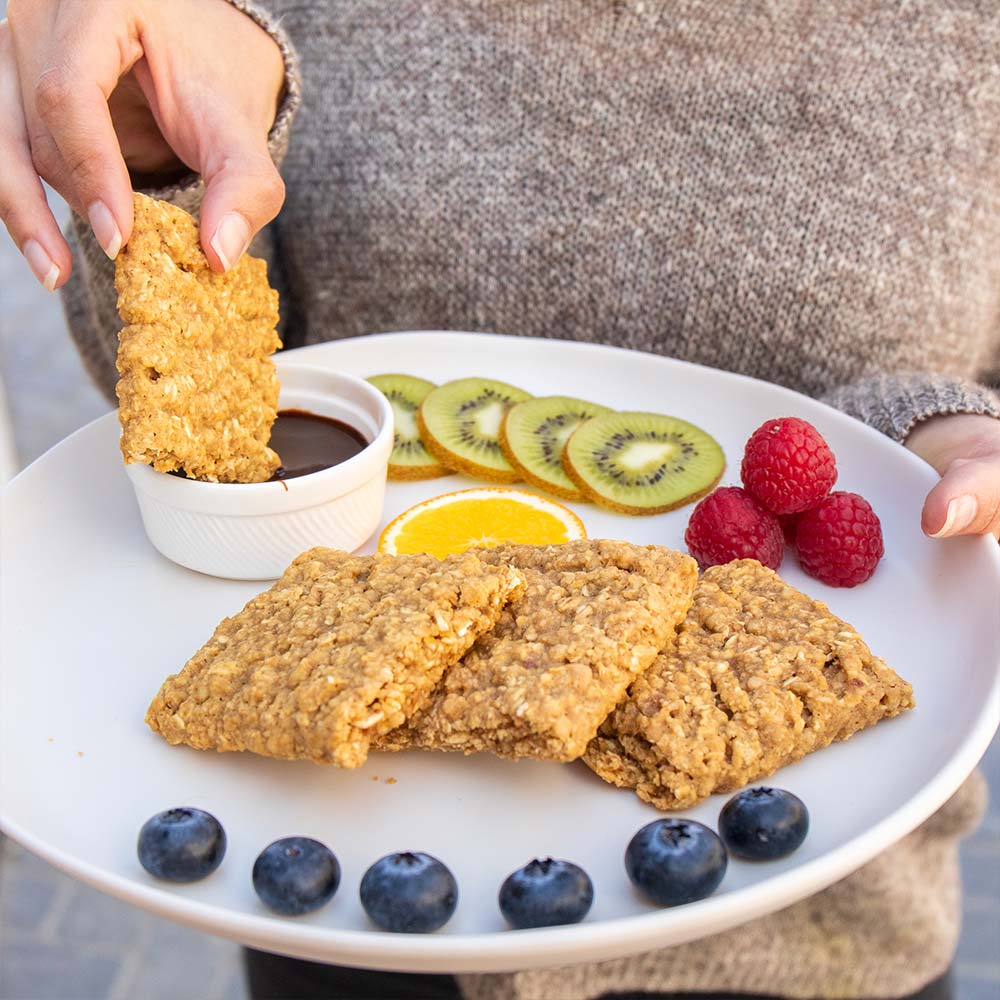Building muscle mass requires not only consistent training but also proper nutrition. However, nutrition is not a one-size-fits-all approach, and different people have different calorie and macronutrient needs depending on their weight, goals, and activity level. If you're looking to build muscle and achieve your fitness goals, it's important to have a tailored approach to your nutrition. In this blog post, we will guide you through the process of customizing your calorie needs and macronutrients to optimize muscle growth in the UAE. Whether you're just starting or have been on your fitness journey for a while, this post will provide you with valuable information and insights. So, let's dive in and learn how to design the best muscle gain meal plan in UAE!

Understanding Calorie Needs for Muscle Gain
Determining the right amount of calories for muscle gain is crucial for achieving the desired results. The number of calories needed
varies from person to person based on several factors.
Factors that affect calorie needs for muscle gain:
1. Bodyweight: Individuals with higher body weights generally
require more calories for muscle gain.
2. Activity level: Those who engage in intense workouts and
physical activities may need more calories to support muscle growth.
3. Metabolism: People with a faster metabolism typically
require more calories to gain muscle.
4. Goals: The specific goals of an individual, such as the
amount of muscle gain desired, influence calorie needs.
A calorie surplus is necessary for muscle gain in the UAE. This means consuming more calories than the body needs for maintenance. This surplus provides the extra energy required for muscle growth and repair.

Importance of Customizing Macronutrients for Muscle Gain
When it comes to gaining muscle, customizing
macronutrients is of utmost importance. Macronutrients refer to the three key
components of our diet - protein, carbohydrates, and fats. Tailoring these
macronutrients to meet your specific muscle gain goals can have a significant
impact on your results.
Why customizing macronutrients is important for muscle gain
Every individual has unique dietary needs and preferences.
By customizing macronutrients, you can ensure that you are consuming the right
balance of nutrients to support muscle growth. This customization allows you to
optimize your nutrition and maximize your results.
The impact of protein intake on muscle gain
Protein, often hailed as the building block of muscles, is essential for muscle growth. Increasing your protein intake can enhance muscle protein synthesis and promote muscle repair. Customizing your macronutrients allows you to ensure that your protein intake is adequate to support muscle gain.

Optimal carbohydrate and fat ratios for muscle gain
Carbohydrates provide the necessary energy for intense
workouts and fuel muscle growth. Customizing your macronutrients allows you to
determine the optimal amount of carbohydrates to consume to support your energy
needs and muscle growth. Similarly, healthy fats play a crucial role in hormone
production and overall health. Customization helps you strike the right balance
of fats to support muscle gain while maintaining overall health.
Designing an Effective Muscle Gain Meal Plan
When it comes to muscle gain, nutrition plays a crucial role. Designing an effective meal plan is essential to support muscle growth and achieve optimal results. Here are some key components to consider when creating a muscle gain meal plan:

Meal Timing and Frequency
The timing and frequency of meals are important for muscle
gain. It's recommended to consume multiple meals throughout the day
to provide a steady supply of nutrients to support muscle growth. Aim for
around 4 to 6 meals, evenly spaced throughout the day. This approach helps
maintain a positive nitrogen balance and promotes muscle protein synthesis.
Incorporating Nutrient-Dense Foods
When designing a muscle gain meal plan, it's crucial to prioritize nutrient-dense foods. These foods provide essential vitamins, minerals, and micronutrients necessary for muscle repair and growth. Include lean sources of protein, such as chicken, turkey, fish, and tofu. Incorporate complex carbohydrates like brown rice, sweet potatoes, and whole grains. Don't forget healthy fats like avocado, nuts, and olive oil.

Caloric Surplus
To gain muscle, it's important to create a caloric
surplus. This means consuming more calories than your body burns. However, it's
essential to find the right balance. Aim for a caloric surplus of around
250-500 calories per day. This surplus provides the energy needed for muscle
growth without excessive fat gain.
Tracking Macros
Tracking macronutrients (protein, carbohydrates, and fats)
is crucial for an effective muscle gain meal plan. Protein is especially
important as it provides the building blocks (amino acids) for muscle repair
and growth. Aim for about 1.6-2.2 grams of protein per kilogram of body weight.
As for carbohydrates and fats, individual preferences may vary. However, it's
recommended to consume enough carbohydrates for energy and fats for hormone
regulation and overall health.
Remember, designing a muscle gain meal plan in the UAE should be personalized and based on individual needs and goals. Consulting with a registered dietitian or nutritionist can help design an effective and sustainable meal plan that supports muscle growth and overall well-being.

Choosing the Right Protein Sources for Muscle Gain
Protein is an essential nutrient for muscle gain.
When selecting protein sources for your muscle gain journey, it's important to
consider various factors.
Popular Protein Sources for Muscle Gain
1. Lean meats such as chicken breast, turkey, and lean cuts of
beef are commonly consumed protein sources in the UAE.
2. Fish, including salmon and tuna, provide high-quality
protein and omega-3 fatty acids.
3. Eggs are an affordable protein source with a good amino acid
profile.
4. Dairy products like milk, yoghurt, and cottage cheese are
rich in protein and also provide calcium.
Considerations When Choosing Protein Sources for Muscle Gain
While animal-based proteins are widely consumed, it's
important to consider your dietary preferences and any allergies or
intolerances you may have. Additionally, consider the quality and source of the
protein to ensure it fits within your overall health goals. For example, opting
for grass-fed and organic options can provide additional nutritional benefits.
Plant-Based Protein Options for Muscle Gain
If you follow a vegetarian or vegan diet, there are several
plant-based protein sources available. Some options include:
1. Legumes such as lentils, chickpeas, and black beans.
2. Quinoa, a complete protein that contains all essential amino
acids.
3. Tofu and tempeh, which are soy-based protein sources.
4. Seitan, is a high-protein food made from wheat gluten.
5. Plant-based protein powders, such as pea protein or hemp
protein.
By incorporating a variety of plant-based protein sources into your diet, you can meet your muscle gain goals while following a vegetarian or vegan lifestyle.

Balancing Carbohydrates and Fats for Maximum Muscle Growth
When it comes to muscle growth, finding the right
balance of carbohydrates and fats in your diet is crucial. Both of these
macronutrients play a significant role in fueling your workouts and supporting
muscle growth.
The role of carbohydrates in muscle growth
Carbohydrates are the body's primary source of energy. They
provide the fuel needed to power through intense workouts and support muscle
recovery. It is important to prioritize complex carbohydrates such
as whole grains, fruits, and vegetables. These sources offer a steady release
of energy and are packed with essential vitamins and minerals.
The importance of healthy fats for muscle growth
Fats are often overlooked but are essential for optimal
muscle growth. They are involved in hormone production, which is crucial for
muscle-building processes. In the UAE, focus on incorporating healthy fats from
sources like avocados, nuts, seeds, and fatty fish. These fats provide
essential omega-3 fatty acids and help support overall health and muscle
growth.
Finding the right balance of carbohydrates and fats for muscle growth
While the specific ratio of carbohydrates to fats may vary
based on individual preferences and goals, a general guideline is to aim for a
moderate carbohydrate intake and a slightly higher fat intake. This provides
the energy needed for workouts while allowing for adequate fat consumption to
support muscle growth. Experiment with different ratios and adjust based on
personal responses and goals.
Optimizing Hydration and Recovery for Muscle Gain
When it comes to muscle gain, optimizing hydration and recovery is crucial. Proper hydration plays a significant role in muscle growth and overall performance. Here are some strategies to help you optimize hydration and recovery for maximum muscle gain:

The Importance of Hydration for Muscle Gain
Staying hydrated is vital for muscle growth as it aids in
nutrient delivery to the muscles and helps maintain proper muscle function. In the
UAE, where the climate is hot and humid, it is even more important to focus on
hydration.
Make sure to drink plenty of water throughout the day, especially during your workouts. Aim to consume at least 8-10 glasses of water
daily. If you engage in intense physical activity, consider adding an
electrolyte drink to replenish lost minerals.
Strategies for Optimizing Recovery for Muscle Gain
Optimal recovery is essential for muscle growth. Here are
some strategies to enhance recovery:
1. Rest and Sleep: Allow your body enough rest between workouts
and ensure you get sufficient sleep each night. Aim for 7-9 hours of quality
sleep to aid in muscle repair and growth.
2. Post-Workout Nutrition: Consume a balanced meal or protein
shake within 30 minutes after your workout. This will provide your muscles
with the necessary nutrients for repair and growth.
3. Stretching and Foam Rolling: Incorporate stretching and foam
rolling into your routine to alleviate muscle soreness and improve flexibility.
4. Active Recovery: Engage in low-intensity activities such as walking, swimming, or yoga on rest days to promote blood flow and aid in recovery.

The Impact of Sleep on Muscle Gain
Sleep is often overlooked but plays a crucial role in muscle
gain. During deep sleep, your body releases growth hormone, which is essential
for muscle repair and growth. Lack of sleep can negatively impact muscle
recovery and hinder your progress. Make quality sleep a priority to optimize
muscle gain.
By implementing these strategies for optimizing hydration
and recovery, you can enhance your muscle gain journey in the UAE. Remember to
stay hydrated, prioritize rest and sleep, and listen to your body's needs for
optimal results.
Supplementation Strategies to Enhance Muscle Gain in the UAE
When it comes to maximizing muscle gain in the UAE,
supplementation can play a crucial role. Here are some popular supplements that
are commonly used:
1. Protein Powders
Protein powders, such as whey protein, are a convenient and
efficient way to increase protein intake for muscle growth. They are easily
digestible and can be consumed post-workout or as a snack throughout the day.
2. Creatine
Creatine is a supplement that enhances muscle strength and
power. It helps replenish ATP levels, allowing for increased muscle performance
during intense workouts.
3. Branched-Chain Amino Acids (BCAAs)
BCAAs are essential amino acids that stimulate muscle protein
synthesis and reduce muscle protein breakdown. They can be taken before,
during, or after workouts to support muscle recovery and growth.
4. Beta-Alanine
Beta-alanine is an amino acid that helps improve muscular
endurance by buffering lactic acid build-up. This allows for longer and more
intense workouts, leading to greater muscle gains.
5. Fish Oil
Fish oil contains omega-3 fatty acids, which have
anti-inflammatory properties and support joint health. This can be beneficial
for individuals who engage in intense weightlifting or resistance training.
It's important to note that while supplements can enhance muscle gain, they should not replace a balanced diet and proper training program. Additionally, it's recommended to consult with a healthcare professional or nutritionist before starting any new supplementation regimen.

Conclusion
Customizing calorie needs and macronutrients is crucial for
muscle gain. By determining the right amount of calories and understanding
the factors that affect calorie needs, individuals can create a calorie surplus
to promote muscle growth. Additionally, customizing macronutrients, such as
optimizing protein intake and balancing carbohydrates and fats, plays a vital
role in maximizing muscle growth. Incorporating nutrient-dense foods, choosing
the right protein sources, and finding the right balance of carbohydrates and
fats are key components of an effective muscle gain meal plan.
Hydration, recovery, and supplementation strategies further enhance muscle gain. By optimizing hydration, focusing on recovery, and considering the
use of supplements, individuals can achieve their muscle gain goals more
effectively. Ultimately, by following these customized approaches, individuals can achieve significant muscle gain and improve their overall
fitness.






























